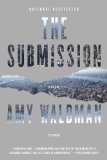Summary | Excerpt | Reading Guide | Reviews | Beyond the Book | Readalikes | Genres & Themes | Author Bio

A Novel
by Amy WaldmanThe Submission
1
"The names," Claire said. "What about the names?"
"They're a record, not a gesture," the sculptor replied. Ariana's words brought nods from the other artists, the critic, and the two purveyors of public art arrayed along the dining table, united beneath her sway. She was the jury's most famous figure, its dominant personality, Claire's biggest problem.
Ariana had seated herself at the head of the table, as if she were presiding. For the previous four months they had deliberated at a table that had no head, being round. It was in an office suite high above the gouged earth, and there the other jurors had deferred to the widow's desire to sit with her back to the window, so that the charnel ground below was only a gray blur when Claire walked to her chair. But tonight the jury was gathered, for its last arguments, at Gracie Mansion's long table. Ariana, without consultation or, it appeared, compunction, had taken pride of place, giving notice of her intent to prevail.
"The names of the dead are expected; required, in fact, by the competition rules," she continued. For such a scouring woman, her voice was honeyed. "In the right memorial, the names won't be the source of the emotion."
"They will for me," Claire said tightly, taking some satisfaction in the downcast eyes and guilty looks along the table. They'd all lost, of course - lost the sense that their nation was invulnerable; lost their city's most recognizable icons; maybe lost friends or acquaintances. But only she had lost her husband.
She wasn't above reminding them of that tonight, when they would at last settle on the memorial. They had winnowed five thousand entries, all anonymous, down to two. The final pruning should have been easy. But after three hours of talk, two rounds of voting, and too much wine from the mayor's private reserve, the conversation had turned ragged, snappish, repetitive. The Garden was too beautiful, Ariana and the other artists kept saying of Claire's choice. They saw for a living, yet when it came to the Garden they wouldn't see what she saw.
The concept was simple: a walled, rectangular garden guided by rigorous geometry. At the center would be a raised pavilion meant for contemplation. Two broad, perpendicular canals quartered the six-acre space. Pathways within each quadrant imposed a grid on the trees, both living and steel, that were studded in orchard-like rows. A white perimeter wall, twenty-seven feet high, enclosed the entire space. The victims would be listed on the wall's interior, their names patterned to mimic the geometric cladding of the destroyed buildings. The steel trees reincarnated the buildings even more literally: they would be made from their salvaged scraps.
Four drawings showed the Garden across the seasons. Claire's favorite was the chiaroscuro of winter. A snow shroud over the ground; leafless living trees gone to pewter; cast-steel trees glinting with the rose light of late afternoon; the onyx surfaces of the canals shining like crossed swords. Black letters scored on the white wall. Beauty wasn't a crime, but there was more than beauty here. Even Ariana conceded that the spartan steel trees were an unexpected touch - reminders that a garden, for all its reliance on nature, was man-made, perfect for a city in which plastic bags wafted along with birds and air-conditioner runoff mixed in with rain. Their forms would look organic, but they would resist a garden's seasonal ebb and flow.
"The Void is too dark for us," Claire said now, as she had before. Us: the families of the dead. Only she, on the jury, stood for Us. She loathed the Void, the other finalist, Ariana's favorite, and Claire was sure the other families would, too. There was nothing void-like about it. A towering black granite rectangle, some twelve stories high, centered in a huge oval pool, it came off in the drawings as a great gash against the sky. The names of the dead were to be carved onto its surface, which would reflect into the water below. It mimicked the Vietnam Veterans Memorial but, to Claire, missed the point. Such abstraction worked when humans could lay their hands on it, draw near enough to alter the scale. But the names on the Void couldn't be reached or even seen properly. The only advantage the design had was height. Claire worried that some of the families - so jingoistic, so literal-minded - might see the Garden as conceding territory to America's enemies, even if that territory was air.
Excerpted from The Submission by Amy Waldman. Copyright © 2011 by Amy Waldman. Excerpted by permission of Farrar, Straus & Giroux. All rights reserved. No part of this excerpt may be reproduced or reprinted without permission in writing from the publisher.
I like a thin book because it will steady a table...
Click Here to find out who said this, as well as discovering other famous literary quotes!
Your guide toexceptional books
BookBrowse seeks out and recommends the best in contemporary fiction and nonfiction—books that not only engage and entertain but also deepen our understanding of ourselves and the world around us.